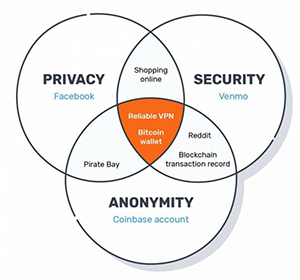Canal Mail Corp: Your Hub for Daily Insights
Explore the latest news, tips, and trends across various topics.
The Hidden Side of Bitcoin: Shady Privacy Secrets You Need to Know
Uncover Bitcoin's dark side! Explore the shady privacy secrets that everyone else is ignoring. Stay informed and protect your crypto investments!
Unmasking Bitcoin: What You Didn't Know About Privacy Risks
While many view Bitcoin as a beacon of financial freedom and privacy, it's imperative to understand the hidden privacy risks that come with its use. Unlike cash transactions, which are largely anonymous, Bitcoin transactions are recorded on a public ledger called the blockchain. This means that each transaction is permanent and traceable. Anyone with the right tools can analyze the blockchain and potentially link wallet addresses to identities, exposing users to significant privacy vulnerabilities.
Additionally, exchanges and wallet providers often require users to comply with Know Your Customer (KYC) policies, which necessitate sharing personal information. This aggregation of data can lead to breaches and unauthorized access. Furthermore, external factors such as IP address tracking and data mining can further compromise a user's privacy. To truly protect your financial information while using Bitcoin, consider leveraging tools such as mixers, privacy wallets, or exploring alternatives like privacy coins that are designed specifically to enhance anonymity.

Counter-Strike is a highly popular first-person shooter game that pits teams of terrorists against counter-terrorists in various objective-based scenarios. Players engage in intense rounds of tactical gameplay that require teamwork, strategy, and sharp reflexes. For those looking to enhance their gaming experience, using a cloudbet promo code can provide exciting bonuses and rewards.
The Dark Web's Relationship with Bitcoin: A Double-Edged Sword
The relationship between the Dark Web and Bitcoin is a fascinating yet alarming aspect of the digital economy. On one hand, Bitcoin has empowered many users on the Dark Web to conduct transactions anonymously, providing a level of privacy that traditional currencies cannot offer. This anonymity has led to the proliferation of illegal activities, including drug trafficking and the sale of stolen data. According to a report by the Reuters, over 60% of transactions on Dark Web marketplaces were conducted using Bitcoin, highlighting how crucial this cryptocurrency is in facilitating these operations.
However, the association of Bitcoin with the Dark Web is a double-edged sword. While it has gained notoriety for its use in illicit activities, Bitcoin also serves as a legitimate means of transaction in various sectors, providing services to those who may not have access to traditional banking systems. Furthermore, the rise of cryptocurrency regulation is gradually mitigating the illegal connotations tied to Bitcoin. As law enforcement agencies become more adept at tracking Bitcoin transactions, the Dark Web may face increased scrutiny, leading to an evolution in its economic landscape. Thus, understanding the Dark Web's relationship with Bitcoin is essential for grasping both the risks and potentials of this cryptocurrency.
Is Bitcoin Really Anonymous? Debunking the Myths of Cryptocurrency Privacy
The perception of Bitcoin as an anonymous currency has fueled a myriad of myths about its privacy features. While it is true that Bitcoin transactions do not reveal personal information directly, the underlying blockchain technology is inherently transparent. Each transaction is publicly recorded on the blockchain, meaning that anyone can trace the flow of funds from one address to another. This transparency can compromise user privacy, especially when cryptocurrency exchanges and wallets require personal identification to comply with regulations, making it easier for authorities to correlate addresses with real identities.
Another common misconception is that Bitcoin guarantees complete anonymity. In reality, cryptocurrency privacy can be significantly enhanced using various techniques, such as employing mixing services or using privacy-focused altcoins. However, these methods come with their own risks and may not always provide the desired level of anonymity. Anyone considering using Bitcoin for privacy should carefully weigh the benefits and drawbacks and ensure they are using best practices to protect themselves. Understanding the true nature of Bitcoin's privacy is essential for anyone looking to navigate the often murky waters of cryptocurrency transactions.